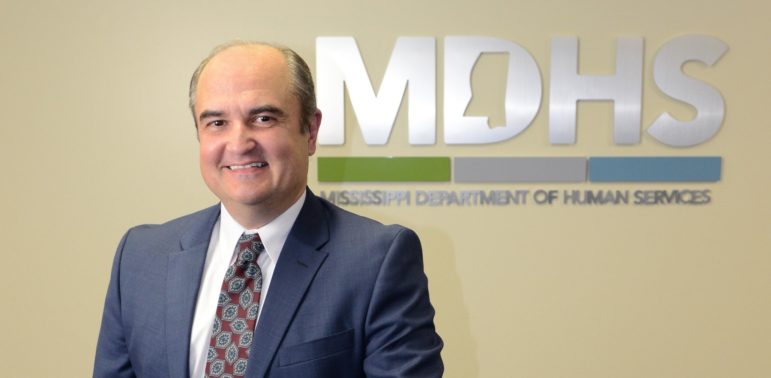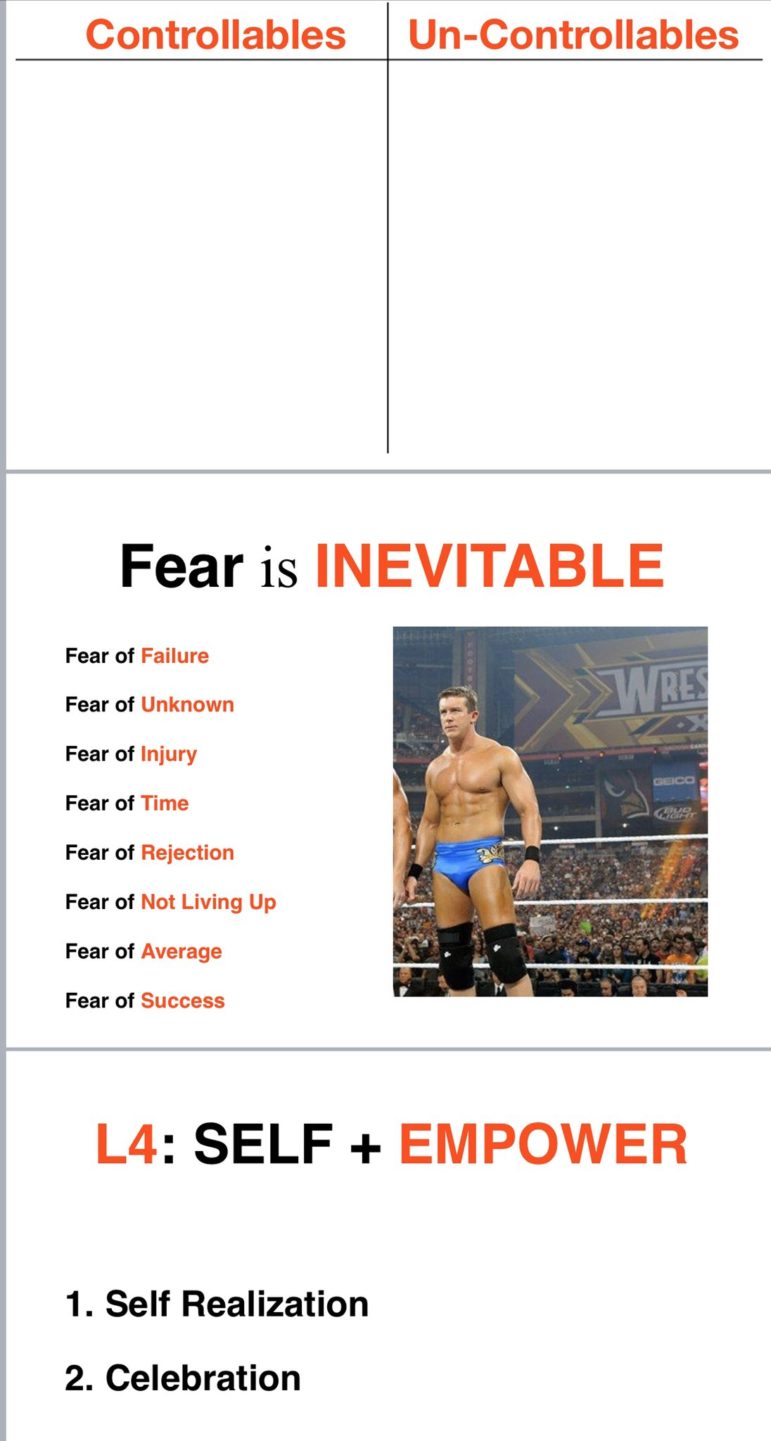

Anna Wolfe
Families First for Mississippi’s former west Jackson office, inside a now shuttered grocery store and run by Mississippi Community Education Center, sat empty one morning in October of 2018. The office was decorated with cobwebs and orange tape for Halloween.
John Davis worked his way up to executive director of the Mississippi Department of Human Services after nearly thirty years with the welfare agency and had begun publicly crafting a new vision for how the state helps the poor.
But by the time he took the helm of an agency that administers over $1 billion in public assistance program in 2016, “he saw it as an opportunity to build a kingdom over there,” State Auditor Shad White said Monday just before releasing a 104-page letter outlining the ways the agency misspent millions.

MDHS Twitter
John Davis, former director of the Mississippi Department of Human Services, was arrested in February within the largest alleged public embezzlement case in state history.
Under the Davis administration, federal funds intended to serve the poor instead enriched his family and friends and paid for lobbyists, luxury vehicles, religious concerts, expensive getaways, publicity events with famous athletes and even a speeding ticket, the state audit published on Monday reveals.
“Once you talk yourself into ignoring the laws and the regs around how to spend the money, it’s easy to talk yourself into increasingly absurd expenditures over time,” White said.
The new report covering fiscal year 2019 officially questions $94 million in Human Services spending, some from previous years. The state auditor’s single audit, conducted every year on behalf of the federal government, sheds new light on the misspending that led to six arrests in early February.
Human Services recently announced it has revised its internal policies and will require welfare subgrantees to submit more comprehensive financial records moving forward. The new executive director Bob Anderson — whom Gov. Tate Reeves appointed earlier this year to replace interim director Jacob Black, Davis’ former deputy — is overseeing an internal investigation to determine if any current employees were involved in the alleged scheme and make any necessary personnel changes. The agency also plans to hire an accounting firm to conduct a forensic audit of the department.
But the agency could still face consequences from the U.S. Department of Health and Human Services, which has the option to cut the state’s grant funding in future years, impose hefty fines or require the state to increase its match to make up for the misspent funds.
When Davis, who is now awaiting trial in the largest public embezzlement case in state history, became director in 2016, the agency was serving a record low number of families through the cash assistance program. The welfare caseload continued to plummet as the state reported spending more money on programming, such as parenting classes and skills training, than on direct payments to poor families. But the department didn’t keep track of who these programs served, and in many cases did not require that the recipients meet income requirements.
“No one ever took the time to see if any of the people were actually eligible or needed the money,” said Stephanie Palmertree, financial and compliance audit director for the state auditor’s office. “And that’s the biggest concern here is, when you’re funding things like baseball fields for select softball teams, obviously that money is going to people who don’t need the money and individuals who actually need that assistance … they’re missing out because you’re choosing to fund services for people who aren’t eligible.”
After taking charge, Davis first dismantled the agency’s competitive bid process for contracts, the auditor said. He directed the agency to make upfront, multi-million dollar payments to Mississippi Community Education Center and Family Resource Center of North Mississippi to run a program they called Families First of Mississippi.
Over less than four years, the Human Services gave the nonprofits about $65 million and $45 million, respectively, according to a review of state expenditures.
Typically, subgrantees for the welfare program submit claims for reimbursement as opposed to receiving upfront payments, several subgrantees told Mississippi Today, making the arrangement with the two nonprofits all the more unusual.
Davis encouraged the nonprofits to pay large sums to retired professional wrestlers Ted Dibiase, Ted Dibiase, Jr., and Brett Dibiase for work they didn’t do or that didn’t help the needy, the auditor said.
Davis was close to the DiBiase family; his agency awarded more than $2 millions in grants to Heart of David Ministry owned by the patriarch, Ted DiBiase Sr., dubbed the “Million Dollar Man.” The director heavily involved both DiBiase brothers Brett and Ted in official department matters and taxpayer funded, out-of-state trips.

Emails suggest Davis and Ted DiBiase Jr. had gone into business together, developing a motivational training program called Law of 16 that they delivered to public agencies on the nonprofit’s dime. Ted DiBiase Jr.’s companies Priceless Ventures LLC and Familiae Orientem received more than $3 million from the nonprofits between 2017 and 2019, but the audit does not show that Davis financially benefited. Davis was even trying to help the wrestler with an autobiography.
A Hinds County grand jury indicted Davis and Brett DiBiase in February for allegedly using welfare funds to pay for Brett’s drug treatment at a Malibu facility. They’ve pleaded not guilty. Davis’ attorney Merrida Coxwell did not return calls to Mississippi Today Monday.
The grand jury also indicted Mississippi Community Education Center’s founder Nancy New and her son Zach New for allegedly embezzling over $4 million for their personal use. They’ve pleaded not guilty. The New nonprofit represents the most egregious misspending, according to the audit: It transferred over $6 million to private schools owned by Nancy New, such as New Summit School, bought luxury vehicles for New family members and paid expensive rents on property owned by the News, only for them to sit empty. Zach New used welfare funds to pay back a loan on his retirement account, the audit says.
The auditor discovered many millions in misspent funds, but he did not specify a dollar amount out of the $94 million that rose to the level of misspending. Many more questioned costs resulted from a lack of documentation showing where the money went.
The money in question came from Temporary Assistance for Needy Families, a federal block grant that states have wide latitude to use to help lower income families, including through cash assistance for very poor families formerly known as the “welfare check.”
Mississippi receives about $86.5 million in TANF from U.S. Department of Health and Human Services each year and must match the grant with state funds. But in any given year, the state is usually also spending federal grant money from previous years, complicating the accounting. The agency had caught heat for failing to spend millions in TANF funds, carrying over a large unobligated balance from year to year, and it began spending down the fund in 2017.
In 2018, the most recent year in which federal reports are available, Mississippi spent about 5 percent of $135 million TANF dollars on direct assistance for families. The state reported spending most of the rest on programming categorized as education and training, supportive services, child welfare and “Fatherhood and Two Parent Family Formation,” on which it spent about $40 million.
While the federal government requires states to provide documentation about the families that receive cash assistance — such as the number of families that meet work requirements — it does not require states to report what it buys with the rest of the money, only how much it used on vague categories.
The department was often cited in previous audits for failing to properly monitor the spending of federal funds. In the single audit released last year, shortly after the auditor’s office began its investigation into Human Services’ TANF spending, the agency was among the most cited, responsible for 10 of the 63 total findings identified in fiscal year 2018. They found management errors associated with $30 million in human services spending, but identified within TANF just over $3,100 in actual questioned costs, which were payments to low-income families that may not have met all requirements to receive benefits.
These annual audits, which focus on an agency’s internal controls, are not effective at identifying fraud, White explained Monday; that kind of revelation usually requires a tip from the inside. The auditor’s office said it began investigating the TANF scheme in June of 2019 after agency employees took information about misspending to then-Gov. Phil Bryant, who turned the information over to White.
When auditor agents arrested the six defendants in early February before the investigation had concluded, White explained that his office moved forward in obtaining the initial indictments in order to prevent any more misspending or theft.

Anna Wolfe
Mississippi Community Education Center’s downtown Jackson office, branded as Families First, was funded with millions of welfare dollars but filled its food pantry with donated food and on the day of the nonprofit founder’s arrest, the shelves were lined almost exclusively with canned corn and green beans.
Mississippi Today first reported that the New nonprofit paid $5 million for the construction of a new volleyball stadium at University of Southern Mississippi; covered the $9,500-a-month mortgage on former football star Marcus Dupree’s ranch in a gated Flora community; and funded a high-profile boot camp-style fitness program offered by former linebacker Paul Lacoste. The audit included each of these purchases as a finding.
The nonprofit paid for the volleyball center through a lease agreement that it utilized one time for a Healthy Teens Rally in 2018. The auditor found that in substance, the payment was a donation, not a lease.
Dupree, who declined to talk to Mississippi Today when visited at the ranch in March, was on payroll at both Mississippi Community Education Center and Family Resource Center of North Mississippi, where he earned hundreds of thousands to travel the state and lecture school children.
The nonprofit funded the Lacoste boot camp with TANF money through a contract with his company Victory Sports Foundation, but the program was not geared toward the poor, the audit says; many professionals and state lawmakers participated free of charge. While Lacoste did not return several phone calls from Mississippi Today, and publicly threatened the publication with legal action, he told Clarion Ledger he did not know he had been paid with welfare funds. The nonprofit paid Victory Sports $1.3 million of its $1.4 million contract and Clarion Ledger reported some of the money paid for expensive dinners at steakhouses.
While the volleyball center, the Dupree ranch and the Lacoste boot camp are questioned in the audit, none of these expenditures are the subject of criminal charges.
The largest fraudulent purchase outlined in the indictments is a $2.15 personal investment the News allegedly made using welfare funds into a medical device company called Prevacus, which is developing a treatment for concussions.
The audit explains that the New nonprofit entered a $1.7 million contract with Prevacus in 2019. Mississippi Today also first reported that football legend Brett Favre had promoted, and discussed with then-Gov. Bryant, according to emails Mississippi Today obtained, two of the projects funded by welfare money: the investment in Prevacus, a company the athlete endorsed, and the new center at Southern Miss where his daughter played volleyball.
The audit reveals more about Favre’s relationship with the News: The nonprofit also paid Favre Enterprises, his business, $1.1 million between 2017 and 2018 “to appear at several events, record promotions, and provide autographs for marketing materials.”
“MCEC provided a list of dates and events that fulfilled the contract terms; however, upon a cursory review of those dates, auditors were able to determine that the individual contracted did not speak nor was he present for those events,” the audit said.
Favre did not return calls or text messages Monday afternoon.
Mississippi Community Education Center also paid Davis’ brother-in-law $150,000 to serve as the department’s “Leadership Outreach Coordinator” and $365,050 through a business lease on a piece of property in Brookhaven. It paid Davis’ nephew $140,809 to develop a coding academy and website design program and $67,769 in salary. Family Resource Center also paid the Davis family members.
Meanwhile, the Families First for Mississippi nonprofits, which received over $100 million since 2017, would not provide any cash assistance to people living in poverty.
“As an agency head, it’s not like I’m sitting back saying, ‘Oh, I don’t want to help these people,’” Davis told Mississippi Today in 2019 just a few months before the investigation began. “My job is to help people. I don’t get paid any more not to help people.”
The post ‘Increasingly absurd expenditures’: Newly-released audit questions $94 million in DHS spending appeared first on Mississippi Today.
- NAACP threatens to sue Elon Musk’s xAI over pollution in Mississippi - February 13, 2026
- School consolidation bill dies without a vote in Mississippi Senate - February 13, 2026
- In a village courtroom, a fervent prayer was answered for Ole Miss QB Trinidad Chambliss. But it took quite a while - February 13, 2026